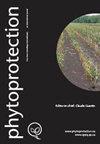Efficacy of two Phlebiopsis gigantea formulations in preventing Heterobasidion irregulare colonization of red pine stumps in eastern Canada
IF 0.2
4区 农林科学
Q4 PLANT SCIENCES
引用次数: 12
Abstract
Heterobasidion irregulare is the scientific name for the North American fungal species that was previously known as H. annosum (P-type) and Fomes annosus. In eastern Canada, the pathogen is found mainly in red pine plantations in southern Ontario and Quebec, where it causes tree mortality. There is no registered control method currently available for this disease in Canada. Phlebiopsis gigantea is a saprophytic basidiomycete successfully used and registered as a biological control agent in several European countries. In order to register a control product in Canada, its efficacy must be demonstrated under field conditions. Trials were performed with two Canadian isolates of P. gigantea in four red pine plantations in Ontario. The mean diameters of treated stumps ranged from 29 to 35 cm. After 2 mo, all 238 stumps treated were free of disease, while 12% of the 120 untreated stumps were colonized by the pathogen. The two formulations without P. gigantea did not prevent the colonization of the stumps by either P. gigantea or H. irregulare. These results show that the two Canadian isolates of P. gigantea can prevent colonization of red pine stumps by H. irregulare and provide support for the registration of P. gigantea as a biocontrol agent in eastern Canada.两种巨白桦制剂预防加拿大东部红松树桩异白螨不规则定植的效果
不规则异泡菌(Heterobasidion irregulare)是北美真菌物种的学名,以前被称为H. annosum (p型)和foes annosus。在加拿大东部,这种病原体主要在安大略省南部和魁北克省的红松种植园中发现,在那里它会导致树木死亡。目前在加拿大没有针对这种疾病的登记控制方法。巨管菌(Phlebiopsis gigantea)是一种腐生担子菌,已在欧洲多个国家成功应用并注册为生物防治剂。为了在加拿大注册控制产品,必须在现场条件下证明其功效。在安大略省的四个红松人工林中对两个加拿大分离株进行了试验。处理后的树桩平均直径为29 ~ 35 cm。2个月后,所有238个处理过的树桩均无病,而120个未经处理的树桩中有12%被病原体定植。两种配方中不含巨藤,均不能阻止巨藤或巨藤在树桩上的定植。上述结果表明,两株加拿大分离菌株均能有效地防治红松树桩上的黑斑病,为黑斑病在加拿大东部地区注册为生物防治剂提供了依据。
本文章由计算机程序翻译,如有差异,请以英文原文为准。
求助全文
约1分钟内获得全文
求助全文

 求助内容:
求助内容: 应助结果提醒方式:
应助结果提醒方式:


